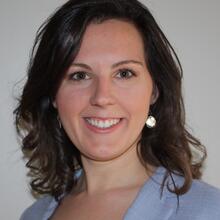At the Democratic National Convention and throughout Kamala Harris’s campaign for president, themes of joy and hope are resonant. Doug Emhoff refers to his wife as a “joyful warrior.” In her speech to the convention, former First Lady Michelle Obama called attention to “the contagious power of hope, the anticipation, the energy, the exhilaration of once again being on the cusp of a brighter day.” And in her acceptance speech for her party’s nomination, Ms. Harris promised to “be a president who unites us around our highest aspirations.”
Joy and hope have become a palpable force among Democrats—the image of Gus Walz pointing to his father, vice presidential nominee Tim Walz, and exclaiming, “That’s my dad!” as tears streamed down his face captures the emotion bringing together the party as it seeks to unite the nation. While Harris’s laugh has been the subject of mockery from former President Trump and others on the right, her joyful and enthusiastic presence evokes hope. Last night, she embraced the mantle and showed that true strength comes from compassion and joy, not enmity and fear, following her own advice: “Never let anyone tell you who you are. You show them who you are.”
As a Catholic woman who believes that integrity matters; that democracy is an important tool for expressing human dignity; that systems based on exploitation or exclusion are not just or sustainable; and that decency and good will are critical components of leadership, I am also feeling the joy. Ms. Harris’s vow “to hold sacred America’s fundamental principles, from the rule of law, to free and fair elections, to the peaceful transfer of power,” and her commitment to fostering the common good—inclusive of migrants, L.G.B.T. persons, women and other marginalized communities—was a reassuring balm when these things are jeopardized. (Granted, many Catholics are disappointed by her defense of abortion rights, but I am grateful for her willingness to “trust women.”) These convictions are rooted in my Catholic faith, and it was a joy to hear a presidential nominee address them energetically and with compassion.
However, I recognize that fully 60 percent of white Catholics (50 percent overall) think otherwise, identifying with the Republican Party. Their convictions, too, grow out of their faith. As I put it in my book (R)evolutionary Hope, we often are tempted to “pick a side, and hope that ‘our side’ wins—for the good of the church.”
But justice is possible only through a transformation of consciousness that moves us to work for the common good with compassion, not with anger, fear, or the desire to dominate the “other.” Pope Francis makes this point explicitly: “no family, no group of neighbors, no ethnic group, much less a nation, has a future if the force that unites them, brings them together and resolves their differences is vengeance and hatred.… Nothing is gained this way and, in the end, everything is lost.” In other words, vengeance and grievance are nihilistic motivators—they might move us in the moment, but we need to ground ourselves in joy and gratitude if we are to promote unity and peace.
Building the world we want to see depends on our willingness to listen compassionately to others, especially those most marginalized, and to cultivate relationships and communities that lift up everyone. As former President Barack Obama put it on Tuesday night, “we need to remember that we’ve all got our blind spots and contradictions and prejudices. And that if we want to win over those who aren’t yet ready to support our candidates, we need to listen to their concerns and maybe learn something in the process.”
In an interconnected world, zero-sum paradigms do not map onto reality, and it is critical that we continuously check ourselves to ensure that what we are building is not reifying the individualistic, materialistic systems of domination that are destructive and not life-giving. We must find ways to build without destroying. As Ms. Harris emphasizes, “a harm against any one of us is a harm against all of us” and “none of us has to fail for all of us to succeed.” There is joy to be found in embracing this interconnectedness.
In this election, as Ms. Harris put it, our nation “has a precious, fleeting opportunity to move past the bitterness, cynicism and divisive battles of the past, a chance to chart a new way forward … guided by optimism and faith.” I hope Catholics will choose to be beacons of this hope—living into the Gospel mission and bringing, as Pope Francis encourages, “the joy born of compassion, the tender love born of trust, the capacity for reconciliation that has its source in our knowledge that we have been forgiven and sent forth.” One way to discern whether we are aligned with the love of God is to consider whether our participation in a given movement evokes in us the Fruit of the Spirit—including joy.







